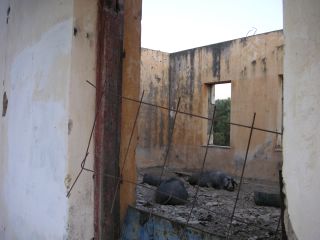
I heard about Mansoura at the same time I heard about Alevga (as they're on the same page of the Rough Guide to Cyprus), but I didn't get to visit it on the same day, as the light was fading by the time I'd arrived in Alevga and gone before I left.
In the Rough Guide, there was only a throwaway line about 'ex-Turkish Cypriot Mansoura, its houses finally being renovated by squatters as weekend retreats' (Dubin, 2005: 204) and, manifestly, I haven't seen all of Mansoura yet, as the only thing that could possibly be described as "renovated" was the first fountain I saw, as it was newly-painted.
In fact, I drove past most of the "buildings" I ended up taking photos of, only doubling back when I saw the ruined building on the hilltop and the fountain in the hillside, then being stunned by what remains of the once abandoned village, as Mansoura is being made invisible by the way it is used, now it is once again occupied.
Dubin, M. 2005: The Rough Guide to Cyprus. London: Rough Guides.





Sam -
ReplyDeletethis abandoned villages stuff you are doing is very interesting. I didn't have any idea that any of them were being reoccupied / acquired. 15 years ago I did a little bit of survey and excavation at Souskiou, an abandoned village east of Paphos for Gordon Thomas at the University of Edinburgh. It was contributing to his research on building construction and collapse, and this was applied in part at the Lemba Experimental Village. If you get in touch with him, he might have some information or ideas about looking at the villages from archaeological perspectives. Back then, the only way that they were being actively used was as goat shelters.
Kenny
Yeah, they're still now being mainly used as goat shelters, or now as more permanent farms, with the farmer(s) living in or near the village; the squatted or rented sites seem to be (formerly) Turkish Cypriot quarters of (formerly) mixed villages.
ReplyDeleteActually, there was one hamlet that I went to, where the houses were all basically reduced to their foundations, where environmentalists were squatting one or two of the houses and restoring them, rescuing them from the goats.
I sympathise with the farmers, particularly the refugees who are still denied a permanent or otherwise secure home. Having met a few now, it's clear that it's not that they're necessarily doing it out of spite or any other negative, clearly damnable wish for Turkish Cypriots and their cultural heritage, but it's difficult not to condemn when their animals inhabit the former homes.
I'll definitely chase him up soon, cheers.
Any luck with the Observer?
Interesting to hear that the farmers are doing it out of economic necessity, not spite.
ReplyDeleteAs for the Observer - well, Jasper Gerrard posted a comment to my blog. Not really an apology - not at all an apology, in fact, but at least a response. At least kicking up a fuss provoked the reader's editor to write a published piece and the offending journalist to write something.
Some of them are doing it out of economic necessity (although I'm sure some would quibble with the use of this term); some are definitely doing it out of spite.
ReplyDeleteIn Maroni, for example, many Turkish Cypriot homes were bulldozed and ploughed into the soil, but agriculture was a distant second thought; the primary aim was to destroy the Turkish Cypriot community, its memory and the memory of it and to prevent the possibility of its return.
Yes, I was disappointed by the reader's editor reproducing some of the highlighted errors, which shows a certain laziness; I was most appalled, however, by the author's reply on your blog.
'[W]hether "gypsy" should be capped or not is getting a little far from the original point as I used the word "pikie". Such people are not necessarily gypsies. Indeed, a recent book was called something like "a guide to pikie living" and can either mean just generally a fairly ramshakle way of living or it can refer to people who live in caravans - not nec people of any particular racial group.'
For him to dismiss one of the correct criticisms of his careless writing precisely by foregrounding his use of a direct slur is truly peculiar. It's like saying, "whether I should have said gays or homosexuals is getting a little far from the original point as I used the word 'poofs'. Such people are not necessarily homosexuals... It can either mean just generally a fairly effeminate way of living or it can refer to people who dress effeminately - not necessarily people of any particular sexuality."
It was nice of him to tell you that just because you're right (I accept that's a generous paraphrase), doesn't mean you have any power or him any obligation to apologise or mend his ways, because you aren't yourself the defamed party.
As for taking the word of councillors or police, I remember an acquaintance from school boasting that his father, who worked in a public capacity, fabricated stories to provide a legal excuse for displacing the perfectly quiet, peaceable traveller community. (I have no idea whether they were Gypsies or not, either, as I had no direct contact with them.) I'm definitely not ascribing the same vile opinions to Gerrard, rather trying to demonstrate that the words are not neutral or acceptable, when I note that they always used and spat the word "Pikies" (or "Gyppos") when they talked about that community.
Life may be "really far more pleasant if people don't sound as if they are so v v cross", but perhaps if he didn't make people so very very cross, they wouldn't sound it and his sensitive ears wouldn't become as offended as theirs were; then, perhaps, life would be far more pleasant for them, as well as for him.